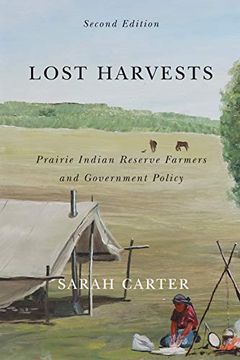Lost Harvests: Prairie Indian Reserve Farmers and Government Policy, Second Edition (Mcgill-Queen's Native and Northern Series) (en Inglés)
Reseña del libro "Lost Harvests: Prairie Indian Reserve Farmers and Government Policy, Second Edition (Mcgill-Queen's Native and Northern Series) (en Inglés)"
Agriculture on Plains Indian reserves is generally thought to have failed because the Indigenous people lacked either an interest in farming or an aptitude for it. In Lost Harvests Sarah Carter reveals that reserve residents were anxious to farm and expended considerable effort on cultivation; government policies, more than anything else, acted to undermine their success. Despite repeated requests for assistance from Plains Indians, the Canadian government provided very little help between 1874 and 1885, and what little they did give proved useless. Although drought, frost, and other natural phenomena contributed to the failure of early efforts, reserve farmers were determined to create an economy based on agriculture and to become independent of government regulations and the need for assistance. Officials in Ottawa, however, attributed setbacks not to economic or climatic conditions but to the Indians' character and traditions which, they claimed, made the Indians unsuited to agriculture. In the decade following 1885 government policies made farming virtually impossible for the Plains Indians. They were expected to subsist on one or two acres and were denied access to any improvements in technology: farmers had to sow seed by hand, harvest with scythes, and thresh with flails. After the turn of the century, the government encouraged land surrenders in order to make good agricultural land available to non-Indian settlers. This destroyed any chance the Plains Indians had of making agriculture a stable economic base. Through an examination of the relevant published literature and of archival sources in Ottawa, Manitoba, Saskatchewan, and Alberta, Carter provides an in-depth study of government policy, Indian responses, and the socio-economic condition of the reserve communities on the prairies in the post-treaty era. The new introduction by the author offers a reflection on Lost Harvests, the influences that shaped it, and the issues and approaches that remain to be explored.

